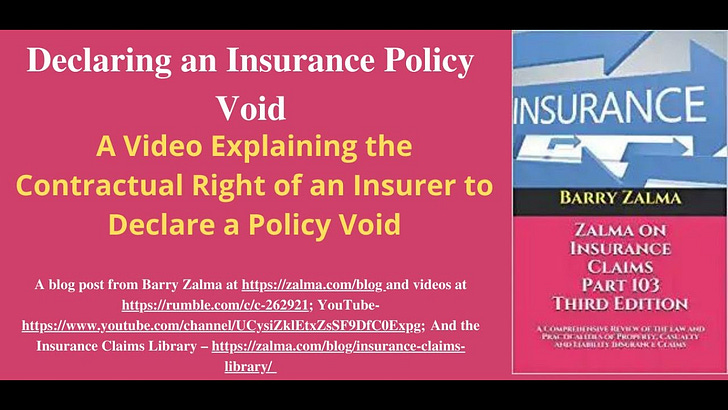A Video Explaining the Contractual Right of an Insurer to Declare a Policy Void
Declaring an Insurance Policy Void
Read the full article at https://www.linkedin.com/pulse/declaring-insurance-policy-void-barry-zalma-esq-cfe and see the full video at https://rumble.com/c/c-262921 and at
and at https://zalma.com/blog plus more than 3850 posts.
Posted on August 30, 2021 by Barry Zalma
A life insurance policy procured with the intent to benefit persons without an insurable interest in the life of the insured does violate the public policy of New Jersey, and such a policy is void at the outset. [Sun Life Assurance Co. of Canada v. Wells Fargo Bank (N.J., 2019)]
When a policy is declared “void” by the insurer, the most common ground is that the insured has breached a condition of the policy, which effectively forfeits the policy. “Forfeiture” is defined in Webster’s 3rd International Unabridged Dictionary as “loss of some right, privilege … in consequence of a … breach of condition or other act.” Generally, if the insurer accepts unearned premiums from the insured at the time of forfeiture or voidance with the knowledge of facts indicating a forfeiture, the insurer waives its right to defend on that ground.
Whenever an adjuster determines that a policy should be declared void based upon policy language similar to the language in the standard fire policy, he or she must coordinate with the underwriting department so that the underwriters are aware of the action and do not inadvertently waive a viable defense. The adjuster should be certain that a copy of the letter declaring that a policy is void is placed in the underwriting file as well as the claim file.
The insured did not make “[a] mere oversight or honest mistake” Rather, he made a knowing misrepresentation of a material fact. Notwithstanding that, even though the misrepresentation was not made at the inception of the insurance agreement, the court held that the insurer was justified in declaring the policy void.
The insurer must prove there was a knowing misrepresentation of fact with the intent of the insureds to have the insurer rely upon it to its detriment from the outset.
© 2021 – Barry Zalma
Barry Zalma, Esq., CFE, now limits his practice to service as an insurance consultant specializing in insurance coverage, insurance claims handling, insurance bad faith and insurance fraud almost equally for insurers and policyholders.
He also serves as an arbitrator or mediator for insurance related disputes. He practiced law in California for more than 44 years as an insurance coverage and claims handling lawyer and more than 54 years in the insurance business.
He is available at http://www.zalma.com and zalma@zalma.com. Mr. Zalma is the first recipient of the first annual Claims Magazine/ACE Legend Award. Over the last 53 years Barry Zalma has dedicated his life to insurance, insurance claims and the need to defeat insurance fraud. He has created the following library of books and other materials to make it possible for insurers and their claims staff to become insurance claims professionals.
Go to the podcast Zalma On Insurance at https://anchor.fm/barry-zalma; Follow Mr. Zalma on Twitter at https://twitter.com/bzalma; Go to Barry Zalma videos at Rumble.com at https://rumble.com/c/c-262921; Go to Barry Zalma on YouTube- https://www.youtube.com/channel/UCysiZklEtxZsSF9DfC0Expg; Go to the Insurance Claims Library – https://zalma.com/blog/insurance-claims-library/ The last two issues of ZIFL are available at https://zalma.com/zalmas-insurance-fraud-letter-2/ podcast now available at https://podcasts.apple.com/us/podcast/zalma-on-insurance/id1509583809?uo=4





